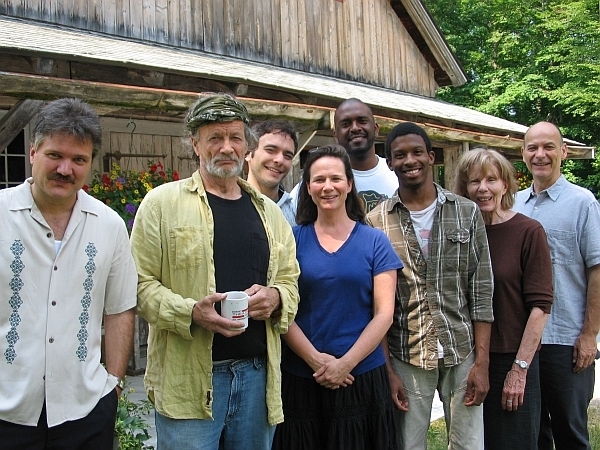
(Host) The Dorset Theater Festival ushers in its 36th professional summer theater season this week with ‘Superior Donuts.’ It’s written by Tracey Letts, whose 2007 play "August: Osage County" won the Pulitzer Prize and a Tony Award.
Superior Donuts is about the redemptive power of friendship. In this case, it’s an unlikely friendship between a disillusioned baby boomer – the donut shop owner – and his employee, a wildly hopeful young African American.
VPR’s Susan Keese takes us Backstage for a preview.
(Keese) Superior Donuts is the story of Arthur Przybyszewski – an aging 1960s relic with a greasy gray ponytail. He’s a former draft dodger whose Polish-immigrant father never forgave him for fleeing to Canada to avoid the Vietnam War.
In the present, where the play is set, Arthur is as shut-down as a man can be – living alone in his old Chicago neighborhood, running the donut shop his father started in the 1950s.
Stephen Payne plays Arthur.
(Payne) "I am a man who’s been deadened to the world, my parents have died, my wife is dead, I have a daughter that I’m estranged from, and all I have is this donut shop where I maybe sell a half a dozen donuts a day."
The neighborhood has also changed – it isn’t polish anymore, but a polyglot of immigrants vying for a piece of the American Dream – something Arthur doesn’t believe in.
But his cynicism is tested when he hires Franco Wicks, a fast-talking black kid who claims he’s written the Great American Novel.
In one scene, Arthur and Franco are setting up the shop for the day’s business, when Arthur slaps down a backpack Franco has given him.
(Arthur) "I read it."
(Franco) "That was fast."
(Arthur) "It’s a quick read."
Franco) "And?"
(Arthur) "It’s really impressive Franco."
(Franco) "Arthur P… you just sit down and tell me every little thing you can think to say about it."
Arthur) "Well, it’s completely engaging from start to finish."
(Franco) "Engaging? You mean in the sense you were interested?"
(Arthur)"Yeah. I think you should show this to some people."
(Keese) Franco also pushes Arthur. He wants to change the menu to include healthy food like bran muffins and yogurt. He wants Arthur to talk with the lady cop, a customer who obviously has a crush on him.
When Arthur thinks of someone who might help connect Franco with a publisher, Franco’s excitement is infectious. He imagines his book in the donut shop window.
(Franco) "Meanwhile you and me are poppin’ out the delicious dessert cakes and people are lined up out the door and down the street, waiting to eat our donuts and drink our coffee."
(Arthur) "Yeah! (Bleep) you, Starbucks!"
(Franco) "When can we get poetry night going?"
(Keese) Then Franco goes too far and imagines Arthur’s daughter in the scene. Arthur snaps out of his euphoria. It isn’t going to happen, he says.
(Arthur) "You’re going to get crushed."
(Franco) "What are you so scared of?"
(Arthur) "I’m not scared of anything."
(Franco) "Are you serious? You don’t talk. You don’t vote. You don’t listen to music. You can’t even ask that old lady out on a date."
(Arthur) "That’s got nothing to do with this."
(Franco) "You can’t even talk about your own daughter."
(Arthur) "You are way out of line."
(Franco) " Right. If I mention her I’m just an employee."
(Arthur) "You are just an employee."
(Keese) Paul Mullins, the director, says the play is also about communities, and what happens when they change.
(Mullins) "I think in the last half of the latter century, our community was the people that were like us. We hung out with the people that were educated like we were, that were the same color that we were, that went to the same church. And that struggle to make sense of a new community, that includes people unlike us, is I think something that he’s talking about."
(Keese) Stephen Payne, who plays Arthur, sees it as something more personal.
(Payne) "From my point of view, the story’s a resurrection."
(Keese) But Arthur’s resurrection from his deadened state doesn’t happen easily. The play includes plenty of humor.
But there’s also violence, and a scene in which Arthur takes a big risk for Franco and his dream.
He also proves, to himself at least, that he’s not a coward. And that’s a big step forward.
For VPR News, I’m Susan Keese.
(Host) Superior Donuts runs through July 3rd at the Dorset Playhouse.